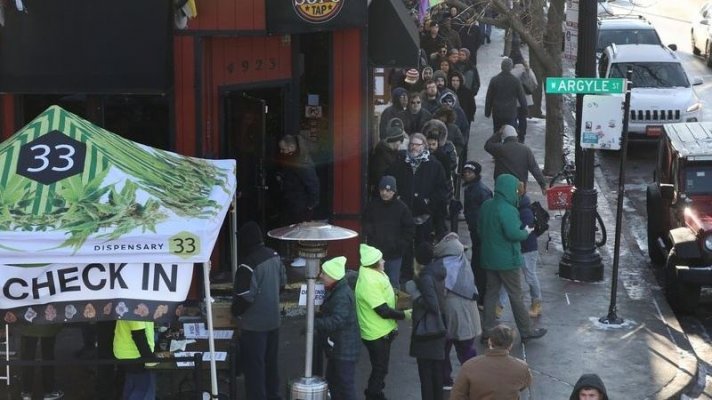Recreational marijuana sales in Illinois generated more than $10 million in tax revenue in January, putting the state on track to surpass Gov. J.B. Pritzker’s budget estimates.
The state collects sales tax and an additional cannabis tax on recreational marijuana sales. January sales generated more than $7.3 million in cannabis tax revenue and more than $3.1 million in sales tax revenue, according to the Illinois Department of Revenue.
Pritzker’s budget estimated the state would collect $28 million in cannabis tax revenue before June 30.
Recreational marijuana sales started Jan. 1 in Illinois and have continued to draw throngs of people to dispensaries. Customers spent more than $39.2 million on legal weed during the first month of sales, one of the strongest showings in the history of marijuana legalization.
Tax revenues follow a similar pattern, with Illinois again landing among the top states.
“No one is selling in any of the neighboring states, and that is having an effect,” said Richard Auxier, a researcher at the Washington, D.C.-based Tax Policy Center. Plus, “Illinois is just a populous state that has major urban centers.”
Some marijuana companies have suggested sales could have been higher if not for a statewide shortage of marijuana product. The shortage, which operators had expected for months, caused some dispensaries to halt recreational sales or institute buying limits starting in the first week of January.
Many dispensaries continue to sell recreational marijuana only on certain days of the week or for restricted hours. Though greater volumes of product continue to filter into the market from Illinois growers, the statewide shortage is expected to last for a year or more.
Facilities that grow weed are expanding, and dozens of dispensaries are expected to open this year around the state. As more product becomes available and sales increase, so too will tax revenues, as they have in other states, Auxier said.
But once sales even out, the state could find itself in a less desirable situation, said Carl Davis, research director at the Institute on Taxation and Economic Policy.
Some states tax marijuana based on weight, and some, like Illinois, levy taxes based on the price consumers pay. That means if marijuana prices go down — which they are expected to do once more dispensaries open — tax revenues could take a hit.
Medical marijuana is not subjected to the marijuana tax, which varies by product and by the content of psychoactive compound THC. Illinois was the first state to tax weed based on the potency.
Marijuana-infused products are taxed at 20%. All other marijuana with 35% THC or less is taxed at 10%, and marijuana with THC content higher than 35% is taxed at 25%. Municipalities can levy an additional 3% tax, which was not included in the figures the state released Monday.
The state also collects a 7% tax from growers on the sale of marijuana products to dispensaries.
Illinois will use the tax receipts to fund its regulation of the industry and invest in communities that have been disproportionately impacted by the war on drugs, among other uses.
The state collects sales tax and an additional cannabis tax on recreational marijuana sales. January sales generated more than $7.3 million in cannabis tax revenue and more than $3.1 million in sales tax revenue, according to the Illinois Department of Revenue.
Pritzker’s budget estimated the state would collect $28 million in cannabis tax revenue before June 30.
Recreational marijuana sales started Jan. 1 in Illinois and have continued to draw throngs of people to dispensaries. Customers spent more than $39.2 million on legal weed during the first month of sales, one of the strongest showings in the history of marijuana legalization.
Tax revenues follow a similar pattern, with Illinois again landing among the top states.
“No one is selling in any of the neighboring states, and that is having an effect,” said Richard Auxier, a researcher at the Washington, D.C.-based Tax Policy Center. Plus, “Illinois is just a populous state that has major urban centers.”
Some marijuana companies have suggested sales could have been higher if not for a statewide shortage of marijuana product. The shortage, which operators had expected for months, caused some dispensaries to halt recreational sales or institute buying limits starting in the first week of January.
Many dispensaries continue to sell recreational marijuana only on certain days of the week or for restricted hours. Though greater volumes of product continue to filter into the market from Illinois growers, the statewide shortage is expected to last for a year or more.
Facilities that grow weed are expanding, and dozens of dispensaries are expected to open this year around the state. As more product becomes available and sales increase, so too will tax revenues, as they have in other states, Auxier said.
But once sales even out, the state could find itself in a less desirable situation, said Carl Davis, research director at the Institute on Taxation and Economic Policy.
Some states tax marijuana based on weight, and some, like Illinois, levy taxes based on the price consumers pay. That means if marijuana prices go down — which they are expected to do once more dispensaries open — tax revenues could take a hit.
Medical marijuana is not subjected to the marijuana tax, which varies by product and by the content of psychoactive compound THC. Illinois was the first state to tax weed based on the potency.
Marijuana-infused products are taxed at 20%. All other marijuana with 35% THC or less is taxed at 10%, and marijuana with THC content higher than 35% is taxed at 25%. Municipalities can levy an additional 3% tax, which was not included in the figures the state released Monday.
The state also collects a 7% tax from growers on the sale of marijuana products to dispensaries.
Illinois will use the tax receipts to fund its regulation of the industry and invest in communities that have been disproportionately impacted by the war on drugs, among other uses.




